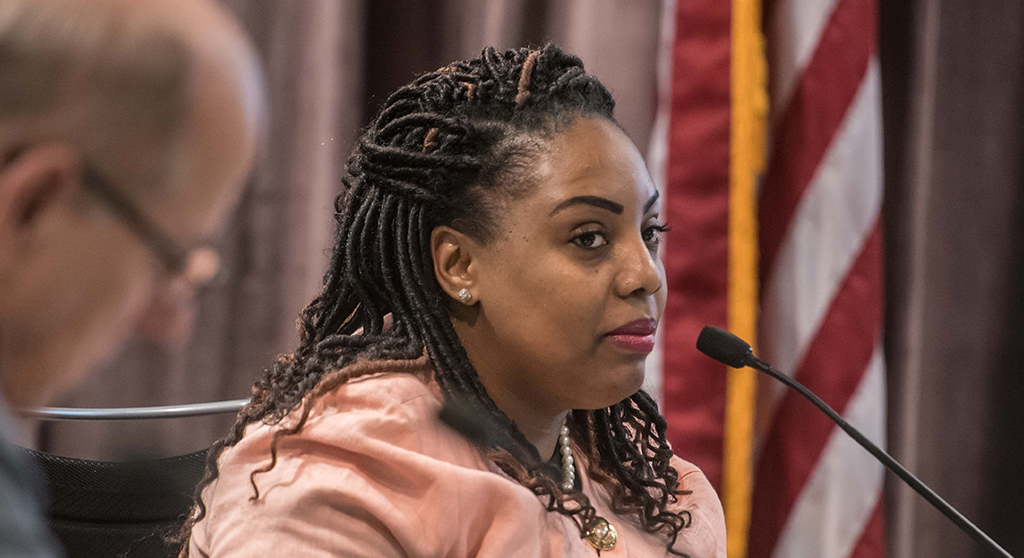Questioning schools’ bid to save $2M, some ask: Did remote learning start well enough to count?

School Committee member Ayesha Wilson, seen at a January meeting, is among those concerned about Cambridge Public Schools claims about remote learning in March. (Photo: Derek Kouyoumjian)
Some School Committee members are questioning whether remote learning was good enough from its start March 16 to justify appealing a $2 million state order in school day requirements.
Members of the public have spoken online and during meetings about their early – and in some cases, continued – dissatisfaction with how Cambridge Public Schools handled remote learning. Like other districts nationwide, it closed campuses to prevent spreading coronavirus infection.
The state Department of Elementary and Secondary Education is adding four days to the academic calendar of schools throughout Massachusetts to make up for slow rollouts of remote learning, but says school committees and executive boards can appeal if their situations were different.
On paper, it seems like a simple case for Cambridge. But a letter drafted by Superintendent Kenneth Salim requesting a waiver triggered surprising pushback Tuesday among committee members reflecting parent concerns and questioning the quality of the district’s remote learning program.
“I’m not in favor of by any means of extending school into June,” said member Ayesha Wilson, but public comment from families that do not feel remote learning has been effective left her struggling with the language in the appeal letter, she said.
Mayor Sumbul Siddiqui was another member who disliked the idea of extending the school year, but was ambivalent about the reasons for requesting a waiver. Like Wilson, she said she was “struggling.”
“What I feel is … uncomfortable in the ask that we’re making to DESE for this,” Siddiqui said. “I want to be very clear with them about why. That’s where I’m having a hard time gathering facts for the appeal.”
The state says a district may appeal if it can “demonstrate that their remote learning model was fully functional during the week of March 16 or can present other exceptional circumstances” – and it appears to be the “fully functional” language that is the sticking point for some members.
District math
The state instituted the four-day requirement for districts that did not cancel April vacation – which begins with the Patriots’ Day holiday – so they can compensate for delays rolling out remote learning. Cambridge Public Schools implemented remote learning without delay, and did not cancel April vacation, so the $2 million (at $500,000 a day) would be for days teachers already worked and are already being paid for.
The amount is equivalent to 1 percent of the 2020 fiscal year budget. Even if the district hits its most optimistic projection of an end-of-year budget surplus of $1.8 million, the state’s demand would result in an outstanding balance – and because the district is not permitted to run a deficit, it would have to turn to the city manager and City Council to cover the additional costs.
On the other hand, if the district appeals and gets a waiver, it could use any surplus budget at its discretion, including toward summer programs and to address learning loss during the FY21 budget year.
What budget surplus could buy
Member Rachel Weinstein said she wants to make sure the district uses money and staff time effectively – but while no workdays had been lost, the framing of the letter needed to shift away from maintaining that there has been no loss of learning time, she said.
Member David Weinstein (no relation) said the letter should emphasize that the district can use the $2 million to support other forms of learning. But he was not eager to ask for a waiver until the district presents a plan.
If the savings from this year can be rolled into summer programs or the next school year, the difference for students will be significant, Member Jose Luis Rojas Villarreal said.
Member Fred Fantini agreed, and supported applying for the waiver. He pointed out that seniors will have graduated, many students will have started summer vacation and that the community, which was experiencing “a lot of frustration,” needed a break.
“We did move forward in that first week of closures, and it’s important to give educators and parents space to breathe,” said member Manikka Bowman, emphasizing the toll the pandemic is taking on the community. “We can make the case to DESE that we put steps in place to move forward with remote learning … it may not be not perfect, but we did it.”
The salient question
That was in line with a comment by Salim that the focus of the waiver request is whether remote learning was implemented promptly.
“The salient question is … the value of the number of days versus the investment of those dollars in other things,” Salim said.
He recommended filing the appeal letter and, if it is successful, using any budget surplus to address issues that will benefit the school community including learning loss; mental health and trauma issues; and educator support.
Salim said that his office will incorporate feedback from the discussion and bring a revised letter to the committee to vote on at its Tuesday meeting.




